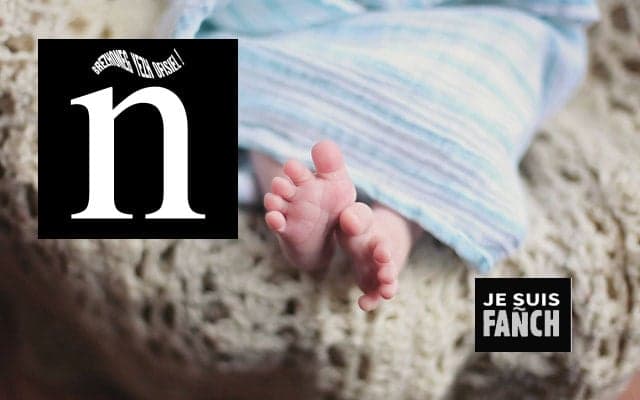French name wars: Brittany tells Paris to allow the 'foreign' letter 'ñ'

Regional authorities in Brittany have stepped in in an attempt to push the French government to accept the use of the controversial letter 'ñ' in first names after a couple were banned from calling their son 'Fañch'.
The row between Brittany and authorities in Paris over a so-called "foreign" letter is heating up.
The regional council of Brittany voted on Friday to push the Justice minister in Paris to allow the use of the tilde symbol (seen here above the letter n - ñ) in first names.
The move came after a couple from Brittany were barred from giving their son the traditional Breton name 'Fañch'.
"It's about defending liberty, that of the choice of the parents. It's about a fundamental right, that's to say fighting linguistic discrimination," said regional councillor, Isabelle Le Bal.
On September 13th, a tribunal in Quimper in Brittany's Finistère department refused to allow the couple to call their child 'Fañch' on the basis that authorising the "ñ" would be "deliberately breaking the will of the state of law to maintain the unity of the country and equality irrespective of origin".
READ ALSO:

Photo: AFP
"The principle according to which babies' names are chosen by their mothers and fathers must have limits when it comes to using a spelling which includes a character not recognized by the French language," the court in the town of Quimper said in its judgment.
But the couple, who are appealing the decision, were furious, with his father Jean-Christophe Bernard saying at the time that the battle wasn't over.
"He will have his tilde, that's for sure," Bernard said.
"When? We don't know. We'll see with a lawyer and with the town hall what we can do."
An official in Quimper had initially refused to write "Fañch" on the baby's birth certificate, before changing their mind a few days later. Born in May, the baby already has an ID card and passport with the tilde on it.
Even though the letter "n" with a tilde (ñ) is more commonly associated with Spanish, it also exists in Breton, the traditional language of Brittany.
Indeed "Fañch" is a name borne notably by two Breton writers, Fañch Peru and Fañch Broudig, and is the Breton version of the name François.
Parents in France have often fallen foul of the rules regarding baby names.
Up until 1993 parents in France had to choose a name for their baby from a long list of acceptable "prenoms" laid out by authorities.
But the list was scrapped under President François Mitterand and French parents were given the liberty to be a little bit more inventive.
However courts can still ban names if they decide it is against the child's best interests with names like Nutella, Fraise (Strawberry) and Manhattan have also fallen foul of the French name police in recent years.
READ ALSO:

Comments
See Also
The row between Brittany and authorities in Paris over a so-called "foreign" letter is heating up.
The regional council of Brittany voted on Friday to push the Justice minister in Paris to allow the use of the tilde symbol (seen here above the letter n - ñ) in first names.
The move came after a couple from Brittany were barred from giving their son the traditional Breton name 'Fañch'.
"It's about defending liberty, that of the choice of the parents. It's about a fundamental right, that's to say fighting linguistic discrimination," said regional councillor, Isabelle Le Bal.
On September 13th, a tribunal in Quimper in Brittany's Finistère department refused to allow the couple to call their child 'Fañch' on the basis that authorising the "ñ" would be "deliberately breaking the will of the state of law to maintain the unity of the country and equality irrespective of origin".
READ ALSO:

Photo: AFP
"The principle according to which babies' names are chosen by their mothers and fathers must have limits when it comes to using a spelling which includes a character not recognized by the French language," the court in the town of Quimper said in its judgment.
But the couple, who are appealing the decision, were furious, with his father Jean-Christophe Bernard saying at the time that the battle wasn't over.
"He will have his tilde, that's for sure," Bernard said.
"When? We don't know. We'll see with a lawyer and with the town hall what we can do."
An official in Quimper had initially refused to write "Fañch" on the baby's birth certificate, before changing their mind a few days later. Born in May, the baby already has an ID card and passport with the tilde on it.
Even though the letter "n" with a tilde (ñ) is more commonly associated with Spanish, it also exists in Breton, the traditional language of Brittany.
Indeed "Fañch" is a name borne notably by two Breton writers, Fañch Peru and Fañch Broudig, and is the Breton version of the name François.
Parents in France have often fallen foul of the rules regarding baby names.
Up until 1993 parents in France had to choose a name for their baby from a long list of acceptable "prenoms" laid out by authorities.
But the list was scrapped under President François Mitterand and French parents were given the liberty to be a little bit more inventive.
However courts can still ban names if they decide it is against the child's best interests with names like Nutella, Fraise (Strawberry) and Manhattan have also fallen foul of the French name police in recent years.
READ ALSO:

Join the conversation in our comments section below. Share your own views and experience and if you have a question or suggestion for our journalists then email us at [email protected].
Please keep comments civil, constructive and on topic – and make sure to read our terms of use before getting involved.
Please log in here to leave a comment.